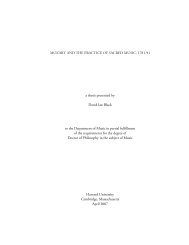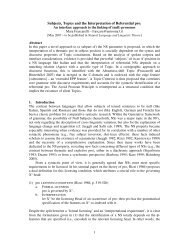draft of November 2011
draft of November 2011
draft of November 2011
You also want an ePaper? Increase the reach of your titles
YUMPU automatically turns print PDFs into web optimized ePapers that Google loves.
(Giannakidou:Merchant:1997)<br />
Returning to our analysis, we argue that the weak indefinites in (72) are NumPs; we, then,<br />
analyse IAD as a case <strong>of</strong> NumP ellipsis (Tomioka 2003). 27 A NumP ellipsis analysis <strong>of</strong> IAD<br />
accounts for the availability <strong>of</strong> IAD with subjects in Greek—see (17) repeated as (73). We<br />
also explain why IAD is unavailable in Italian, since there are no NumP arguments in the<br />
language.<br />
(73) a. A:irthe kanis? B:ne irthe<br />
A:came-3sg anyone? B:yes, came-3sg<br />
A:Did anyone come? B:Yes, someone did.<br />
b. A:tilefonisan fitites? B:ne tilefonisan<br />
A:phoned-3pl students? B:yes, phoned-3pl<br />
A:Did students phone? B:Yes, some did.<br />
One question is why the whole NumP cannot be elided with definites as in (71). The<br />
reason is interpretative. Absence <strong>of</strong> definite marking gives rise to indefinite interpretations.<br />
Consider for instance (74). The answer in (74b) involves a weak indefinite with an elided noun<br />
despite the definite antecedent; a definite is not appropriate in this case.<br />
(74) a. tis eferes tis valitses<br />
them.cl brought-2sg the-acc suitcases<br />
Did you bring the suitcases?<br />
b. efera (kamposes); mu ehun mini tris teseris akoma<br />
brought-1sg (many); me have-3pl left three four still<br />
I brought quite a few; but still have three or four left.<br />
Let us now reconsider examples like (75), discussed earlier. Following Zimmermann (1993)<br />
let us assume that idravliko and dada in (75) denote properties. The examples indicate that<br />
Greek pronouns resist property anaphora; the pronominal requires a referential antecedent. 28<br />
The property anaphora effect is achieved through IAD, i.e. recycling the antecedent noun.<br />
27 The ellipsis analysis preserves the basic intution <strong>of</strong> Giannakidou and Merchant (1997) who also propose<br />
that IAD involves NP deletion; however, they assume that the elided NP is headed by a null D.<br />
28 Greek pronouns can take natural functions as their antecedents as shown in examples like (i) discussed in<br />
Alexopoulou and Heycock (2003). Such antecedents though are still extensional.<br />
40
















